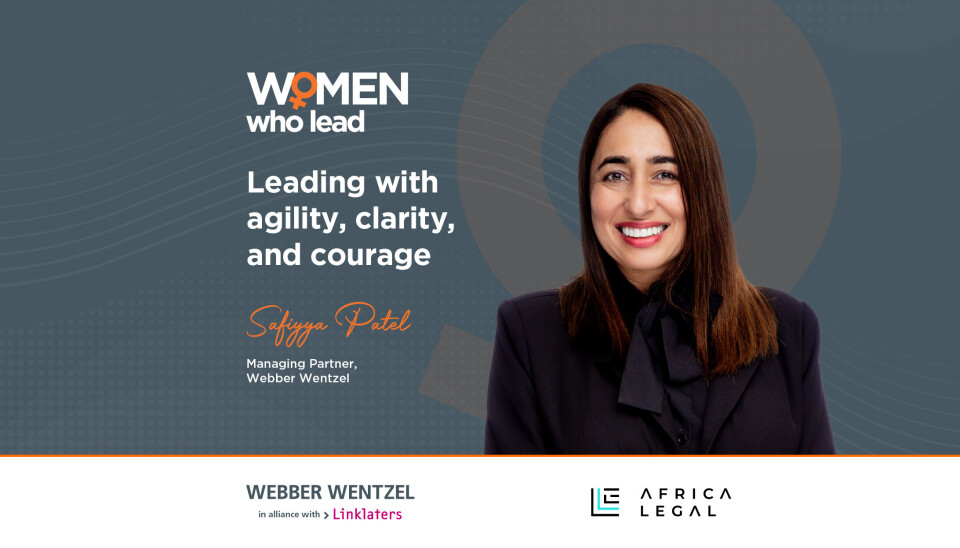Copyright : Re-publication of this article is authorised only in the following circumstances; the writer and Africa Legal are both recognised as the author and the website address www.africa-legal.com and original article link are back linked. Re-publication without both must be preauthorised by contacting editor@africa-legal.com
Women’s Month: Leading with agility, clarity, and courage

On 1 March, Safiyya Patel became the first black female Managing Partner in Webber Wentzel’s prestigious 150+ year history. She discusses navigating modern times of rapid change and what differentiates a great leader from a great lawyer
While technical excellence is ‘the entry ticket’ for rising to the top in the legal profession, what differentiates a great lawyer from a great leader is the ability to inspire, influence, and connect with people, says Safiyya Patel.
“In today’s environment, soft skills like emotional intelligence, resilience, and adaptability are not ‘nice-to-haves’, they are strategic assets. The best leaders in law can bridge the two: they bring deep legal expertise while building trust, motivating teams, and creating an environment where people can do their best work.”
Safiyya herself brings plenty of both to her role as Managing Partner of Webber Wentzel, a leading African firm that traces its roots back to 1869 in the Eastern Cape.
After growing up in a single-parent household during Apartheid, Safiyya excelled academically and has built an outstanding career, becoming a globally recognised commercial, M&A and BEE transactions expert, and leader in the legal profession.
Late last year, the firm’s new Senior Partner, Gareth Driver, called Safiyya’s appointment to the Managing Partner role “a significant milestone” in the transformation of not only Webber Wentzel, but the broader legal sector. He praised her “purpose-driven and people centred approach” to law and leadership.
For Safiyya, being a modern leader in rapidly changing times means leading with agility, clarity, and courage. “You need to anticipate the future, adapt quickly, and make decisions with both conviction and humility. For me, leadership is about creating stability for your teams while navigating uncertainty, ensuring people remain focused, supported, and inspired even when the ground is shifting.”
Listening is key, says Safiyya, and often overlooked as an important leadership skill.
“Listening builds trust, uncovers blind spots, and allows you to make better decisions,” she shares. “Leadership isn’t just about having the loudest voice in the room - it’s about creating a space where other voices can be heard.”
As one of a small but growing number of women to lead major African law firms, Safiyya is proud of the pioneering work Webber Wentzel has done, and continues to do, to create pathways for women to lead, not just in legal practice but in all areas across the firm. This includes the firm’s Fusion team, led by Aalia Manie, which brings together lawyers, engineers, project managers, operations and design specialists and others to drive innovation, and deliver integrated, client-focused solutions that push the boundaries of what is possible in the legal industry.
“We are intentional about sponsorship and mentorship; we strive to give women meaningful opportunities to lead high-impact matters, drive client relationships, and take on senior leadership roles,” says Safiyya, who took the baton from Sally Hutton, who served for a decade as the first female Managing Partner of a major South African law firm. “We also invest in flexible working arrangements and an inclusive culture where different leadership styles are valued. Representation matters, and we work to ensure that women see themselves reflected at every level of the firm.”
Safiyya believes the modern generation of women leaders in law want to see a profession that measures success beyond billable hours, and values impact, innovation, and inclusion. That offers flexibility without penalty, diverse leadership that reflects wider society, and a culture that supports ambition and wellbeing.
And for the young African women taking their first steps into an evolving legal profession, whether as law students or candidate attorneys, Safiyya says they should look to build technical skills, but also cultivate their network, voice, and confidence.
“Own your space unapologetically… Seek out mentors and sponsors who will open doors for you. Most importantly, remember that you belong in every room you step into, even if you are the only woman, the only African, or the youngest person there.”
